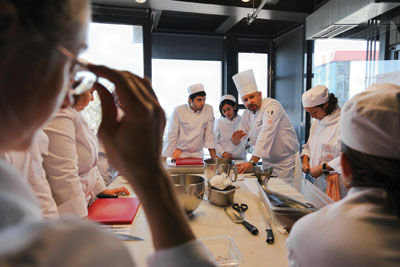
Education insights
August 18, 2011
By Anthony Borgo
Alot of work goes into the development of a new culinary program in the
Ontario college system. There are many questions that need answering
prior to starting the process.
Alot of work goes into the development of a new culinary program in the Ontario college system. There are many questions that need answering prior to starting the process. A new program is developed to meet student, social and labour needs, and to complement the strategic direction of the college.
 |
|
| Today’s students are interested in small class sizes and face time with instructors.
|
A new program must meet the college’s curriculum standards, industry committee apprenticeship regulations, and the approval of the Ontario Ministry of Training, Colleges and Universities. A list of courses – the program outline – for any culinary program should attract a student much like a well-written menu does a customer. Educators, much like chefs, will tell you that it’s all in the menu planning. There are many stages and steps to creating a new educational program. From concept to design, and development through implementation, it’s an elaborate and cumbersome undertaking.
There are a number of ways in which new programs emerge but primarily they come about in response to an additional program offering in the college system or in response to current industry trends. Development principles are subject to rigorous scrutiny to ensure that colleges are able to prepare students with the basic knowledge of industry terminology, specific working certifications, and discipline and work ethics. Trying to help students prepare for their chosen field has its challenges. Educators are always learning about how to better connect students with the industry. They are focused on building symmetry between prospective employees and ready employers.
Teaching and preparing students for today’s job market is about getting students to apply skills and techniques. These learning outcomes are developed through a scope of practice. This is the technical description of activities that constitute the work that is part of a trade. Our role is to help students achieve and become better on-the-job learners. Teachers need to focus on learning that is measurable and calculated. Helping students figure out how they learn and assimilate knowledge is paramount in obtaining a deep and positive understanding of subject matter. Students need to focus on the fundamental skills and techniques that will make them a marketable commodity in the industry. A well put-together program should take the student through all stages of the learning process and allow them to build upon their skills through active experimentation. All students become successful if they can develop the confidence to apply real on-the-job skills. Achievement through education brings a confident, employable person to the work force. It’s up to industry to show students how to succeed from there.
An educational program should allow students to learn, formulate new interpretations and critique their work. Most culinary programs attract learners through a sense of the trade history and the art of craftsmanship. But not all students make a choice to attend a college based on the reputation of a program alone. Much as it is during the hiring process , “fit” seems to be at the forefront of the decision-making process.
Smaller class sizes and increased face-to-face time with instructors are what interest students. Some colleges design their curriculum and present program outlines in a tidy and well-written list that conjures up images of modern and contemporary learning. It all has a look and feel that excites the curious learner until they arrive in the classroom, where they may feel disconnected from their surroundings and experience a quick lesson with the smoke-and-mirrors approach to learning. Developing courses and content should mean more than trying to make a program appear cutting edge using convoluted language. The focus should always be about delivering a quality education through learning and self-improvement.
These qualities are complex and burden faculty throughout the development of a new program. They require constant attention and continual review in order to achieve the right mix in the classroom. A good faculty team that invests the time because its members care and believe in this process helps develop the best graduates. Individuals that go forth into the industry and become successful understand that learning never ends – completing one aspect of an education moves them to the next step on a continuum of lifelong learning.
Two of the top 10 college programs that have been steadily growing over the past few years are cooking and baking. Serving and consuming good food has become a conscious priority in our social fabric. Food has seen a resurgence in the mainstream culture, which has translated into huge growth in cooking schools and post-secondary programs. The demand for qualified cooks has been on the rise, with a special demand for those skilled in international cuisine and baking. The culinary arts field is a challenging one and staying current on new trends in taste and nutrition are a must for any foodservice worker. A career in cooking or baking can be an extremely rewarding one with a number of ways to diversify and expand in the future. Educational institutions have a responsibility to create new programs, renew current ones, provide students with proper training and supply industry with skill-based workers. And that’s exactly the direction in which we are going.
Borgo, CCC, CBS, is the co-ordinator of culinary programs at Georgian College. In addition to educating cook apprentice, culinary and hospitality management students, Borgo is planning new programming that will enhance employment opportunities for students in central Ontario.
Print this page
Leave a Reply